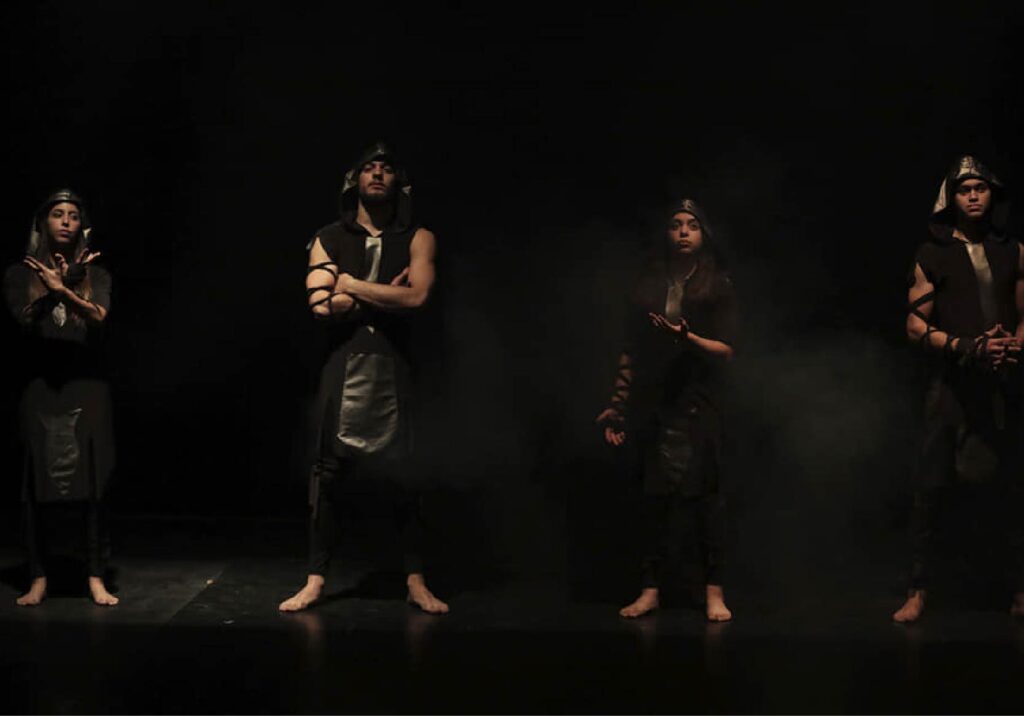
The Levant Labyrinth is a joint work between the actress and director Ranin Odeh the graduates of the Freedom Theatre School in Jenin Camp, the Nablus Performing Arts and Circus School and The Palestinian Circus School.
The director has three years of technical and vocational education focused on cultural resistance, acting, production and movement. She then continued working on a project about women`s empowerment in the community. She has also directed many plays, such as The Bag Owner, The Moon City, Lady Earth and Fairuz.
The actress has also participated in the award-winning play “Return to Palestine”, a production of The Freedom Theatre School. This play was the opening act of The International Festival of Carthage’s 20th session. It also won the award for the best theatre performance at the International Palestinian Festival.
The director Ranin Odeh has entered this labyrinth through her research on women`s issues in the Arab community, especially the Levant. She has coached women in Palestine for three years and based on this she has taken intensive Drama Therapy workshops at both the national and international levels.
This labyrinth is not a new one; it has always been there since the times of ignorance so when we go back in history, we can find the order of Assassins or the new call as they called themselves. It`s a Nizari Isma`ili sect who lived in the mountains of Persia and in Syria and Hassan-I Sabbah was its creator.
The military tactic for these people was the assassination and murder and those who committed these crimes didn`t care about death, only about achieving their goals. They used to scare the rulers and princes who fought them and they killed many prominent figures at that time. The Europeans had much imagination describing these Assassins, and their books abounded in myths around them, so we find the story of the Italian Marco Polo, which is known as “The Myth of Paradise”. We read in this book the description of the castle of death as follows:
“There was a large garden full of fruit trees, and there were palaces and streams overflowing with wine, milk, honey and water, and beautiful girls singing, dancing and playing music. The Sheikh of the Mountain deluded his followers that this garden is paradise, and it was forbidden for anyone to enter it, and its entry was restricted only to those who decided that they will join the hashish crowd. The Sheikh of the Mountain used to put them in the castle in groups and drug them to sleep. After that he ordered them to be carried and placed in the garden, and when they woke up, they would think that they had gone to Heaven, and after they had satisfied their cravings for joy, they were drugged again.
Then they leave the gardens and are sent to the Sheikh of the Mountain, and they kneel in front of him and he asks them where they came from. They respond: “From heaven,” then the Sheikh sends them to assassinate the wanted people and he promises them that if they succeed in their missions, he will return them to Heaven again, and if they are killed while doing their duties, angels will come to them to take them to Heaven!”
Then the director merged feminist issues, the hashish sect, and the story of Cain and Abel, the first murder in human history on earth that happened for a woman. The question is: is the female a blessing or a curse? Are we going to fight for women? Or do we end the war and kill the woman?
This historical epic was translated through the analysis of movement, circus and drama, as the trainer and director transformed the research and personal stories on the ground through the work of four actors embodying all of the above on stage. Moreover, the work is not devoid of oriental thought, Palestinian folklore, endless love stories, equality between men and women, humanity, power, proving existence, continuous rape of women’s rights, murder in the name of honor, and gender problems, but until when? The women`s issue is an integral part of the issue of men.
Performed by: Tala Younes, Rama Al-Najjar, Wajdi Khaled, Nour Samaro
Directed by: Ringing Odeh
Lighting techniques: Yasser Nabulsi
Sound and Logistics: Jana Shafei